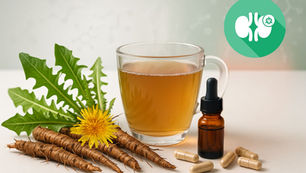top of page
Insights from Nature


Dandelion Root for Kidneys: Natural Diuretic or Risk?
Many people look to herbal remedies for natural support, and dandelion root (Taraxacum officinale) is one of the most popular choices.
Traditionally regarded as a diuretic herb, dandelion root is still used today in teas and supplements to support fluid balance and urinary health. But is it really effective—and more importantly, is it safe? This article explores what research says about dandelion root and the kidneys.


Oregano vs Marjoram: What Every Health-Savvy Reader Should Know
A Tale of Two Herbs, One Mission. Suppose you have ever sipped a warm herbal tea on a chilly evening or reached for a natural remedy when your immune system felt sluggish. In that case, you have probably brushed against the power of oregano or marjoram. These two green herbs, often mistaken for one another in appearance, hold stories that extend far beyond the kitchen. Both have been treasured for centuries, not only for their flavor but also for their role in health, traditi


Dandelion Root Benefits, Uses, and Safety: Complete Guide
IntroductionDandelion root (Taraxacum officinale) is often recognized as a common plant found in gardens and lawns. Yet, for centuries, this humble root has been valued in traditional medicine for its potential to support digestion, liver health, and natural detoxification.Today, more people are discovering dandelion root through teas, capsules, extracts, and even roasted coffee alternatives. With increasing attention on natural wellness, the question remains: What does scien


Dandelion Root for Liver Health: What the Research Says
Introduction The liver is one of the body’s most important organs, responsible for detoxification, nutrient processing, and metabolism. Many people look for natural ways to support liver function, and one herb that often appears is dandelion root ( Taraxacum officinale ). But does science really support its use? This article explores the research on dandelion root and liver health, including its potential benefits, traditional uses , dosage , and safety. Why People Turn to Da


Horny Goat Weed for Vitality Before Winter: Heat Up the Cold
Horny Goat Weed, a Chinese herb with a wild name, has sparked energy for millennia. Horny Goat Weed vitality fall boosts are trending as Americans prep for winter vigor. Key Health Benefits of Horny Goat Weed: Boosts Vitality Horny Goat Weed vitality fall revs up energy naturally, Enhances Libido Horny Goat Weed libido fall sparks desire as days shorten, Supports Testosterone Horny Goat Weed testosterone fall lifts male drive, per Horny Goat Weed studies, Lifts Energy Horny


Citrus Bergamot and Blood Pressure: Science Behind the Hype
Metabolic health is about more than just cholesterol—it includes blood pressure, blood sugar, and triglyceride levels. When these markers are out of balance, the risk of heart disease, diabetes, and stroke increases significantly. This cluster of conditions is known as metabolic syndrome.Citrus bergamot, a fruit from southern Italy, has shown promise not only for cholesterol but also for broader metabolic support. Could it also play a role in managing blood pressure? Let’s ex


Bergamot for Weight Loss: Fact, Fiction, or Just Marketing?
The search for natural ways to support weight management has led many people to herbs and supplements. Citrus bergamot, already popular for cholesterol and heart health, is sometimes promoted as a weight-loss aid.But does the evidence support this claim, or is it just another supplement myth? In this article, we’ll explore what research says about citrus bergamot and its possible role in weight control.Quick AnswerCitrus bergamot is not a magic weight-loss pill. However, stud


Bergamot vs Citrus Bergamot: What’s the Real Difference?
If you’ve searched for “bergamot” online, you may have noticed it shows up in very different contexts: as a flavoring in Earl Grey tea, as an essential oil in perfumes, and as a supplement for cholesterol support. This overlap often creates confusion.The truth is that “bergamot” can refer to more than one plant or product. In this article, we’ll clarify the differences between bergamot and citrus bergamot, so you know exactly what you’re getting when you see it in teas, oils,


What Exactly Is Citrus Bergamot? From Earl Grey Tea to Modern Supplements
Citrus bergamot has a fascinating history. Best known as the flavoring in Earl Grey tea, this fruit is also prized for its essential oil in perfumes and aromatherapy. More recently, scientists have discovered unique compounds in citrus bergamot that support cholesterol and heart health, leading to its rise as a dietary supplement.But what exactly is citrus bergamot, and how did it move from traditional uses to the shelves of supplement stores? Let’s explore its origins, histo


Citrus Bergamot vs Statins: A Natural Heart Health Option?
Statins are among the most commonly prescribed medications for lowering cholesterol. At the same time, natural supplements like citrus bergamot have gained popularity as people look for gentler options.This has led to an important question: Can citrus bergamot replace statins, or is it better used as complementary support? In this article, we’ll compare how both work, their effectiveness, and what science says about their role in cholesterol management.Quick AnswerCitrus berg


Citrus Bergamot Lower Cholesterol: What Science Really Says?
High cholesterol is one of the leading risk factors for heart disease worldwide. While medications like statins remain the standard treatment, many people are also exploring natural options for added support. Among them, citrus bergamot has gained attention for its unique ability to influence cholesterol levels.In this article, we’ll examine what scientific studies reveal about citrus bergamot’s role in cholesterol management, how it compares to standard treatments, and what


Citrus Bergamot: Scientifically Proven Benefits You Need to Know
Citrus bergamot has long been valued in southern Italy for its fragrance and use in tea. Today, this unique citrus fruit is gaining attention for another reason: its potential health benefits. Extracts from citrus bergamot are now used in supplements that may support cholesterol balance, heart health, and overall metabolic function.In this guide, we’ll explore what citrus bergamot is, the science behind its benefits, possible side effects, and how to choose a supplement that’


Milk Thistle & Dandelion Root: Two Herbal Legends for Liver Health
Why Milk Thistle and Dandelion Root Are More Than Just Herbs. Have you ever walked past a dandelion growing stubbornly in your lawn and wondered if it is really “just a weed”? Or heard about milk thistle but were not sure if it is just another herbal fad? Believe it or not, these two plants have stood the test of time, used for centuries in traditional medicine and now backed by modern science for their liver-supporting and detoxifying properties.


Magnesium Glycinate vs Magnesium Oxide: Which Is Right for You?
Magnesium is an essential mineral involved in energy production, nerve signaling, and muscle function. With nearly half of U.S. adults not meeting the recommended intake, supplements have become increasingly popular. But not all magnesium supplements are created equal. Two of the most common forms—magnesium glycinate and magnesium oxide—offer very different benefits, absorption rates, and tolerability. Choosing the right one depends on your health goals.


Magnesium Glycinate Chelate: What It Means for Absorption
If you’ve shopped for supplements in the U.S., you’ve probably noticed labels that say “magnesium glycinate chelate”. For many consumers, the word chelate is confusing. Does it mean the supplement is stronger? More effective? Or just marketing? The truth is that chelation is one of the key reasons why magnesium glycinate is better absorbed than many other forms. Understanding this process helps explain why this form is often recommended for sleep, stress, and long-term wellne


Magnesium Glycinate vs Magnesium Citrate: Which Is Better?
Magnesium is one of the most essential minerals in human health, supporting over 300 enzymatic reactions. Yet, many Americans do not consume enough through diet alone. This gap is often filled by supplements, but the question remains: which form is best? Two of the most popular types are magnesium glycinate and magnesium citrate. Each has unique benefits, side effects, and ideal uses. Understanding their differences will help you make the best choice for your health goals.


Magnesium Glycinate vs Citrate, Oxide, and More: Choosing Best Form
Magnesium is an essential mineral that supports hundreds of biochemical processes, from energy production to nerve function and muscle recovery. Yet, many Americans do not get enough magnesium from their diet alone. According to the National Institutes of Health (NIH), nearly half of U.S. adults fall short of the recommended intake. This has made magnesium supplements increasingly popular—but with so many forms available, it can be confusing to choose the right one.


Magnesium Glycinate for Women: Hormone, Sleep, and Stress Support
Magnesium glycinate benefits women by easing PMS symptoms, improving sleep quality, reducing anxiety, supporting healthy pregnancy, and protecting bone and muscle health. Its high absorption and gentle profile make it an ideal choice for daily use.


Magnesium Glycinate for Headaches and Migraines: What Science Says
Migraines and chronic headaches affect more than 39 million Americans, according to the American Migraine Foundation. For many, conventional medications are not enough—or cause unwanted side effects. As a result, natural approaches like magnesium glycinate are gaining attention. Magnesium has long been studied for its role in migraine prevention. Among the different forms, magnesium glycinate stands out for its gentle absorption & calming effect. But what does the science rea


Magnesium Glycinate for Anxiety: Does It Really Work?
Anxiety disorders are the most common mental health condition in the United States, affecting over 40 million adults every year. While therapy and medication remain the gold standard, many Americans are exploring nutritional support as part of their wellness routine. One supplement that frequently comes up is magnesium glycinate. Known for its calming properties and gentle absorption, magnesium glycinate is increasingly studied for its potential role in stress and anxiety man


Magnesium Glycinate for Sleep: Science-Backed Insights
Poor sleep affects millions of Americans. According to the Centers for Disease Control and Prevention (CDC), about one in three U.S. adults reports not getting enough rest. Many are looking for natural, non-habit-forming options to improve sleep quality. One supplement often recommended by healthcare providers is magnesium glycinate. This chelated form combines magnesium with the amino acid glycine, creating a calming effect that may improve both sleep onset and sleep quality


What Are The Real-World Benefits of Magnesium Glycinate?
Let’s explore the science behind magnesium glycinate supplements and see why it has become one of the most recommended forms by clinicians and wellness experts alike. Magnesium glycinate offers benefits for sleep, stress, muscle recovery, women’s health, migraine management, and overall nervous system support. Its chelated form makes it highly absorbable and less likely to cause digestive upset than other types of magnesium.


Black Cohosh for Menopause Support: What Science and Tradition Reveal
Black Cohosh, a North American plant, has eased women’s woes for centuries. Black Cohosh menopause fall relief is trending as American women navigate seasonal shifts. Key Health Benefits of Black Cohosh: Eases Menopause Black Cohosh for menopause tames hot flashes and night sweats, Boosts Mood Black Cohosh balances emotions naturally, Improves Sleep Black Cohosh sleep fall calms restless nights,, Supports Women and Herbal Relief.


Ginseng vs Ashwagandha: Which Adaptogen Is Right for You?
In today’s high-speed, burnout-prone world, the search for natural solutions to stress and fatigue has led many Americans to rediscover the power of adaptogens. Ancient herbal remedies help the body adapt to physical and emotional stress. Among the most talked-about are Ginseng and Ashwagandha: two herbal superstars from opposite sides of the world, both praised for their energy-boosting and stress-relieving effects.
bottom of page